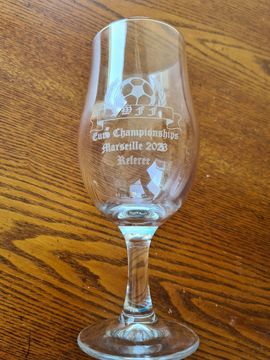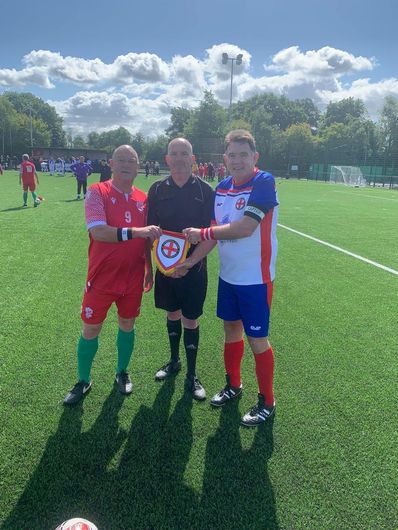Referees and the Laws of the Game

All referees are suitably qualified, experienced both at home and at an international level. Our referees are sponsored by The Walking Football Referees Association (WFRA), the WFRA has a great deal of experience in Referee training, mentoring and observing whilst offering referees a natural progression path and provide referees for all major tournaments.

We have been successful at delivering referee training for several affiliated nations .
Marcus Chamberlain (pictured below) refereed his first "Home Nations International" between Wales WF and IWFF England July 29th 2023. Marcus done a splendid job and will now be put on our register of international referees.

-----------------------------------------
Denying a Goal Scoring Opportunity or DOGSO as it is more commonly known.
There are manly interpretations of this particular law.
How we apply this within our tournaments is as follows:
1 Should the referee decide the essential criteria has been met and the offender has clearly denied a "goal scoring opportunity, he will restart the game with an Indirect free kick from where the offence occurred and;
2 The offending player will receive a temporary dismissal from the field of play for the agreed times set by the relevant tournament.
3 should the offence be of a nature where a red card will be issued, the player will be removed from the field of play for that game and possibly other games depending on the situation.
Laws of the Game 2023
The Laws of the Game (LOTG) can be long winded and often confusing however we always adopt the Football Associations LOTG. To simplify this we produce a condensed version which is constantly under review, please see below for this years (simplified) version.
Prior to any of our tournaments we spend a considerable amount of time with managers and revision for the referees to ensure everyone fully understands and applies them correctly.
2023 - TOURNAMENT RULES
1. Squads & Rules
a) A maximum squad of 12 registered playing persons per age/category is allowed.
b) Games will be six a side (inc GK)
c) 25 mins per game (12.5 mins per half)
d) Roll on roll of subs – only to be made:
- when the ball is out of play (not a stoppage in play) and,
- with the referees permission
e) No slide tackling, tackle from behind, through a players legs or from the side unless the ball is free and playable
f) No direct shooting from the kick off (at least one pass is mandatory)
There will be no grace time allowed for teams not at the field of play at the scheduled time of kick off. The opponent team will be awarded a 3 – 0 win for the game.
2. Age & Category
Players must meet the age requirements of the group (category) they are playing in.
Team sheets must be submitted prior to the tournament showing the following:
a) Players names
b) Dates of birth
c) Players must only play in one category unless prior dispensation is applied for and approval is given.
Managers may apply in writing to seek dispensation to info@iwff.org.uk providing reasons for seeking dispensation.
3. Health & Wellbeing
3.1 All players must be fit and healthy for either travel or take part in the tournament.
3.2 This must be confirmed on the team sheet by the manager at the time of submitting the team sheet to the IWFF
3.3 Players who has recently had major surgery must produce a doctors certificate declaring them “Fit to Play”.
It is the managers responsibility to ensure the above checks are undertaken in order for the organisation to fulfil their duty of care.
4. Players equipment
No metal studded boots - correct playing equipment
Shin guards must be worn.
5. Running
5.1 Players must not run either with the ball or off the ball.
5.2 Three running offences by the same player will result in a period in the sin bin (3 mins).
6. Head Height
If, in the opinion of the referee, the whole of the ball goes above 6ft (1.82mtrs) from the ground then it is always out of play. An indirect free kick will be awarded accordingly.
7. Goal Keepers
7.1 If the ball goes above head height from a goalkeeper’s save and into the goal, the goal is not allowed.
7.2 If the ball goes above head height from a goalkeeper’s save and back onto the field of play, the ball is deemed out of play will be brought back into play by the goalkeeper.
7.3 Goal keeper cannot pick the ball up with his hands if passed back from a team mate
7.4 The goalkeepers must roll the ball underarm or kick the ball to bring it back into play (no drop kicks).
8. Ball in and out of play – the ball is in play at all times unless:
8.1 the referee stops the game
8.2 the whole of the ball crosses the line (side and goal lines) 8.3 the ball goes above head height
9. Free Kicks
All free kicks are indirect.
A goal cannot be scored from a free kick even if it deflects off another player.
10. Minimal Contact: Whereas some contact is expected If in the opinion of the referee:
10.1 contact is minimal and appears accidental then play on
10.2 contact appears careless and with too much force then a free kick is awarded (player may be warned)
10.3 contact is reckless, irrespective of whether it’s minimal or forceful, then a free kick is awarded and potentially a blue or red card shown to the offender.
11. Restricted back pass
After the goalkeeper has distributed the ball they can only receive the ball back if:
11.1 the ball has been touched by an opponent or,
11.2 the ball has been touched by at least two of their teammates.
12. Penalty Kick
A penalty kick is awarded for the following offences:
12.1 a defending player deliberately enters their own penalty area 12.2 a goalkeeper deliberately exits their own penalty area
The player taking the penalty kick must be no more than 2 mtrs from the ball before taking the penalty kick.
13. Balls
Size 5 footballs.
14. Blue and Red Cards
14.1 One blue card and the player will be sent to the sin bin for 3 mins for either 3 running offences, excessive contact with a player of the opposition and anything considered reckless by the referee.
14.2 Two blue cards and the player will be suspended for the remainder of that game – team must play a man down for the remainder of the game
14.3 Red Cards will be issued for reckless or dangerous play, gross misconduct including foul and abusive language.
Depending on the severity of the situation any player who receives a red card may be disqualified for taking part in the remainder of the tournament. This decision will be made by the Referee Director following discussions with the match referee.
15. Discipline & Conduct
Players and spectators are expected to conduct themselves within the spirit of the game . Players or spectators ejected from the game by the referee will be required to leave the playing area. Severe misconduct that is abusive, harassing insulting or offensive will result in disqualification from the remainder of the tournament.
16. The Referee
The decisions of the referee regarding Laws of the Game are final. The decisions of the referee and all other match officials must always be respected.
